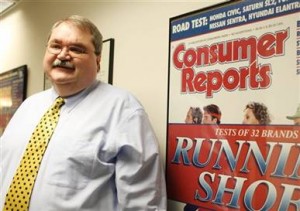It may be the end of the Internet as we know it.
That was the reaction from consumer advocates and some websites after the Federal Communications Commission announced new rules governing Internet service on Thursday. The rules effectively put an end to net neutrality, or the idea that all web traffic should be treated equally.
“Definitely, consumers are the losers,” said Todd O’Boyle, a program director at Common Cause, a left-leaning public interest lobbying group. “The sites they rely on on a daily basis may not work in a way they’ve come to rely on.”
The FCC insists, however, that the new rules would not harm Internet users. In a blog post Thursday, FCC Chairman Tom Wheeler said there had been “a great deal of misinformation” about the proposal, which he said would not permit “behavior harmful to consumers or competition by limiting the openness of the Internet.”
Here are some key points to understand regarding the changes:
What is net neutrality and why is this happening?
Net neutrality is the idea that your Internet provider must treat all Web traffic equally. A court decision in January struck down FCC rules meant to ensure that Internet providers do not discriminate by blocking or slowing certain content.
That decision opened the door for Internet providers like Comcast and Verizon to cut deals with content providers, which would pay to stream their content in an Internet “fast lane.”
After the ruling, the FCC said it would revise its rules. That’s what happened Thursday.
What do the new rules say?
The new rules would allow companies like Netflix to pay Internet providers to stream their videos and other content more quickly. That could create two lanes on the Internet, fast super-highways that big tech companies can afford and a bumpy backroad where less fortunate websites dwell, consumer advocates say.
Verizon, which sued the FCC for the right to cut such deals, said Thursday that it had no intention of preventing customers from viewing certain sites.
Verizon and other Internet providers “have always made clear that we support an open Internet and we have publicly committed to ensuring that customers can access the Internet content they want, when they want and how they want,” the company said in a statement.
The FCC said these deals would still be fair because Internet providers would be required to reveal how they handle traffic, how much they charge companies for access to fast lanes, and whether they’ve given preferential treatment to their own content.
That last part could become especially important as Internet providers are increasingly becoming entertainment companies. AT&T said this week it plans to launch a new online video service. Comcast owns NBC Universal, which includes 30 cable networks, 26 local TV stations and part of the streaming service Hulu.
Internet providers would be required to act in a “commercially reasonable manner,” according to the FCC, which will vote on the proposed rules later this year.
What could that mean for me, in English, please?
First off, the web could get more expensive. The impact on the average Internet user will likely not be felt right away. But over time, websites would probably pass on to consumers the costs of paying for high-speed access, according to Harold Feld, a senior vice president at the consumer group Public Knowledge.
In addition, it could become difficult to view certain websites owned by companies that can’t afford to pay for access to an Internet fast lane, Feld said.
On top of Internet users potentially paying more, they would also be more confused, Feld said. Under the proposed rules, people would need to make sense of a fragmented Internet landscape where the time it takes to load an online video would depend on whether that website paid extra to their Internet provider. Consumers may start choosing their Internet providers based on which websites they like to visit.
Feld compared the situation to the exclusive deals that AT&T and Apple once made that only allowed AT&T subscribers to purchase the iPhone.
This sounds pretty frustrating.
It would be. Under the FCC’s proposed rules, the quality of online streaming services like Netflix or HBO Go would depend on whether those services are paying your Internet provider or not, Feld said.
“It will become more fragmented and more frustrating,” he added.
The proposed rules could affect not just entertainment, but also education. If schools use an online curriculum made by a company that cut a deal with Verizon, students who subscribe to Verizon’s Internet service at home would have an advantage over other students who subscribe to another provider, Feld said.


